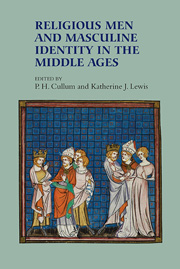Book contents
- Frontmatter
- Contents
- List of illustrations
- Contributors
- Acknowledgements
- Introduction
- From salve to weapon: Torah study, masculinity, and the Babylonian Talmud
- Gender and hierarchy: Archbishop Hincmar of Rheims (845–882) as a religious man
- The defence of clerical marriage: Religious identity and masculinity in the writings of Anglo-Norman clerics
- Writing masculinity and religious identity in Henry of Huntingdon
- ‘The quality of his virtus proved him a perfect man’: Hereward ‘the Wake’ and the representation of lay masculinity
- Episcopal authority and gender in the narratives of the First Crusade
- ‘What man are you?’: Piety and masculinity in the vitae of a Sienese craftsman and a Provençal nobleman
- ‘Imitate, too, this king in virtue, who could have done ill, and did it not’: Lay sanctity and the rewriting of Henry VI's manliness
- John of Bridlington, mitred prior and model of the mixed life
- Why men became monks in late medieval England
- Feasting not fasting: Men's devotion to the Eucharist in the later Middle Ages
- Index
‘The quality of his virtus proved him a perfect man’: Hereward ‘the Wake’ and the representation of lay masculinity
Published online by Cambridge University Press: 05 September 2013
- Frontmatter
- Contents
- List of illustrations
- Contributors
- Acknowledgements
- Introduction
- From salve to weapon: Torah study, masculinity, and the Babylonian Talmud
- Gender and hierarchy: Archbishop Hincmar of Rheims (845–882) as a religious man
- The defence of clerical marriage: Religious identity and masculinity in the writings of Anglo-Norman clerics
- Writing masculinity and religious identity in Henry of Huntingdon
- ‘The quality of his virtus proved him a perfect man’: Hereward ‘the Wake’ and the representation of lay masculinity
- Episcopal authority and gender in the narratives of the First Crusade
- ‘What man are you?’: Piety and masculinity in the vitae of a Sienese craftsman and a Provençal nobleman
- ‘Imitate, too, this king in virtue, who could have done ill, and did it not’: Lay sanctity and the rewriting of Henry VI's manliness
- John of Bridlington, mitred prior and model of the mixed life
- Why men became monks in late medieval England
- Feasting not fasting: Men's devotion to the Eucharist in the later Middle Ages
- Index
Summary
One Christmas, some years before the Battle of Hastings, Gilbert of Gent held his traditional festivities at his Northumbrian household. He held thrice-yearly contests, ‘testing the strength and spirit of those young men who were hoping for the belt and arms of knighthood by letting wild beasts out from cages’. This season's beast was a particularly ferocious bear: the ‘offspring of a famous Norwegian bear which had the head and feet of a man and human intelligence, which understood the speech of men and was cunning in battle’. Its father had allegedly raped a girl in the woods and fathered Beorn, king of Norway.
Gilbert's eighteen-year-old godson, Hereward, was visiting, having been banished from his homeland for being troublesome. Hereward was eager to have his strength and spirit tested, but Gilbert refused, ‘because although … [he] perceived the bravery of the young man, he feared for his youthfulness’. The bear escaped, and went on a killing spree. Hereward leapt into action, heading the bear off as he was about to attack Gilbert's wife and her women. He drove ‘his sword through its head as far as the shoulder-blades. Leaving the blade there, he lifted up the animal in his arms and held it out to those who followed, at which sight they were much amazed’.
- Type
- Chapter
- Information
- Religious Men and Masculine Identity in the Middle Ages , pp. 77 - 93Publisher: Boydell & BrewerPrint publication year: 2013



